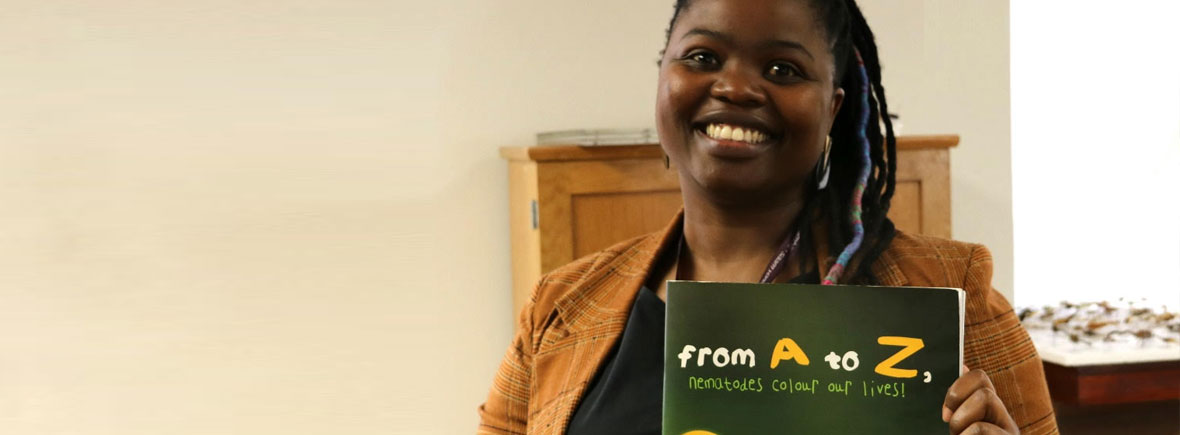Stellenbosch University (SU) is part of a consortium of 14 universities in sub-Saharan Africa, as well as Ghent University in Belgium and the Université Côte d’Azur in France, that works together in terms of a European Union-funded grant for Nematology Education in sub-Saharan Africa (NEMEDUSSA) and aims to uplift the science of Nematology.
In 2012, Ghent University released an English colouring book for children entitled From A to Z, Nematodes Colour Our Lives! that Dr Nomakholwa Stokwe, lecturer and researcher in Nematology at SU Department of Conservation Ecology and Entomology, has since translated into isiXhosa.
The Department brings together a substantial body of teaching and research expertise, including integrated pest management, biological control, natural communities conservation, living resources management, conservation policy formulation, and technology transfer. In addition to being the only university in South Africa with an undergraduate elective module in Nematology (344) (16), SU also offers an MSc programme in Nematology (requiring the successful completion of a master’s thesis), a PhD programme in Nematology (requiring the successful completion of a doctoral dissertation), and a DSc in Nematology (requiring DSc research collection).
At SU, we encounter similar difficulties in relation to the science of Nematology that experts in the field are facing worldwide. The study of plant-parasitic Nematology was initiated at SU in 1973, as part of the Department of Entomology and Nematology, with one full-time staff member, Professor Bertus Meyer, being dedicated to the study of Nematology, until his retirement in 2002. During that time, the Department was fused with another to become a new department called Conservation Ecology and Entomology. For the next 14 years, until 2016, ad hoc nematologists presented a semester module in plant‑parasitic nematodes. In that same year, after expending much effort in support of South African nematologists and entomologists from the Department, Dr Nomakholwa Stokwe was appointed as a full-time staff member and lecturer in the Department.
SU works in close corporation with the North-West University in terms of assisting with short courses and the training of students in the study of plant-parasitic and entomopathogenic nematodes. With SU being the only tertiary-level institution in South Africa that presents an undergraduate course in plant-parasitic nematodes, an urgent need has been felt to revive the postgraduate training of students in such nematodes and the undergraduate training of students in entomopathogenic nematodes. Such training can be accomplished only with the provision of technical and postdoctoral assistance in teaching capacity. Given the lack of available and appropriate staff, the potential for including the study of the science of Nematology at BSc level in sub-Saharan Africa remains fragile.
Nematology, as an independent science alongside other plant health disciplines, requires serious efforts when included as a key area of expertise in university curricula. While trained nematologists currently work mostly at the academic level, the information flow to the community and to smallholder farmers remains insufficient across the entire sub-Sahara Africa region. The current NEMEDUSSA project represents a logical continuation of attempts to make a structural, relatively broad and sustainable impact with nematology education from the grassroots level up. Particularly, more women from the sub-Sahara Africa region should be brought on board. This would ensure a critical mass of qualified women providing nematology awareness instruction and advisory support to rural communities, to reach more female smallholder farmers in South Africa and in the rest of Africa.
With the translation into isiXhosa of Ghent University’s colouring book for children, we hope to familiarise young children and adults alike with the most abundant animal on earth that previously was unknown to them.
For more information about the Erasmus+ Capacity Building in Higher Education: Nematology Education in Sub-Saharan Africa (NEMEDUSSA) project, please visit the project website at https://nemedussa.ugent.be/

